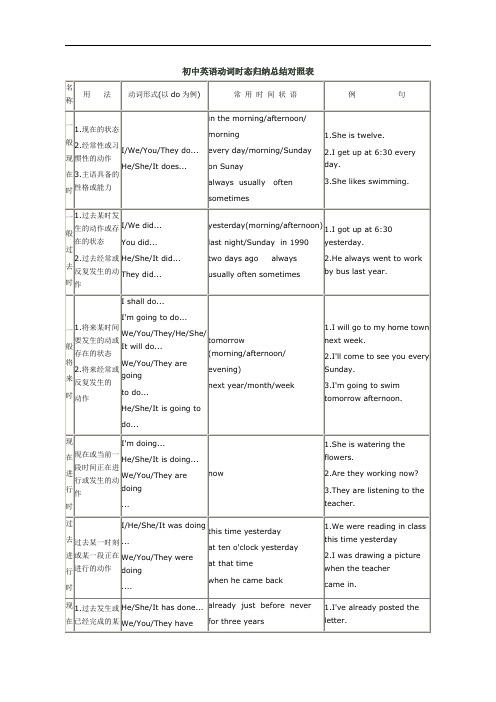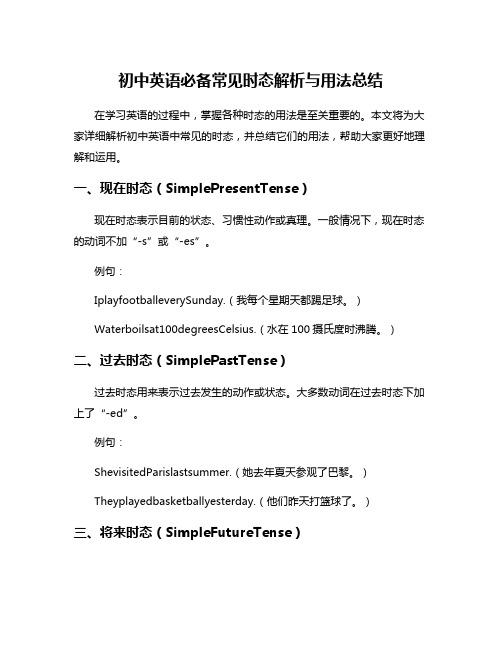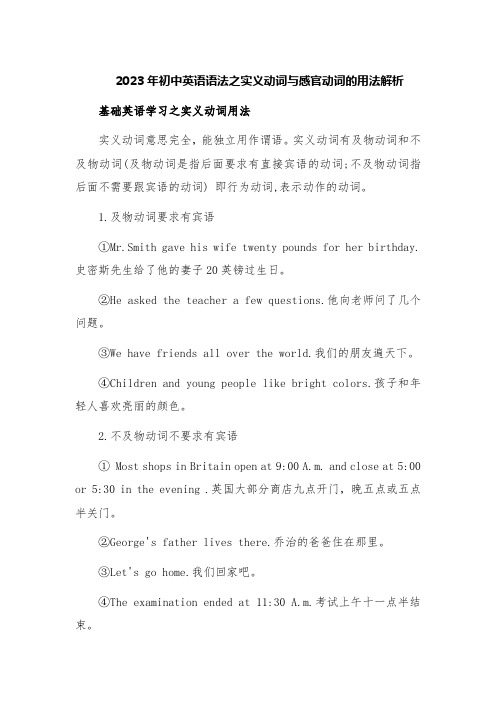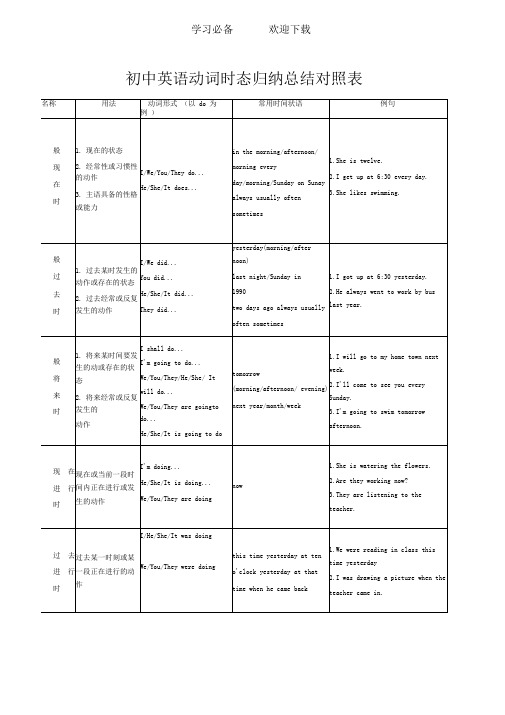初中常用动词习惯用法
初中英语语法时态总结

初中英语语法时态总结-CAL-FENGHAI.-(YICAI)-Company One1初中英语语法动词时态总结一、一般现在时1)经常性或习惯性的动作,常与表示频度的时间状语连用。
时间状语:every…, sometimes, at…, on Sunday。
例如:I leave home for school at 7 every morning. 每天早上我七点离开家。
2)客观真理,客观存在,科学事实。
例如:The earth moves around the sun. 地球绕太阳转动。
Shanghai lies in the east of China. 上海位于中国东部。
3)表示格言或警句。
例如:Pride goes before a fall. 骄者必败。
注意:此用法如果出现在宾语从句中,即使主句是过去时,从句谓语也要用一般现在时。
例:Columbus proved that the earth is round. 哥伦布证实了地球是圆的。
4)现在时刻的状态、能力、性格、个性。
例如:I don't want so much. 我不要那么多。
Ann writes good English but does not speak well.安英语写得不错,讲的可不行。
比较:Now I put the sugar in the cup. 把糖放入杯子。
I am doing my homework now. 我正在做功课。
第一句用一般现在时,用于操作演示或指导说明的示范性动作,表示言行的瞬间动作。
第二句中的now是进行时的标志,表示正在进行的动作的客观状况,所以后句用一般现在时。
二、一般过去时1)在确定的过去时间里所发生的动作或存在的状态。
例如:时间状语有:yesterday, last week, an hour ago, the other day, in 1982等。
例如:Where did you go just now? 刚才你上哪儿去了?2)表示在过去一段时间内,经常性或习惯性的动作。
英语八大时态

初中英语动词时态归纳总结对照表初中英语时态专项练习1、一般现在时。
通常用“usually, often, every day, sometimes”。
一般现在时基本用法介绍一、一般现在时的功能1.表示事物或人物的特征、状态。
如:The sky is blue.天空是蓝色的。
2.表示经常性或习惯性的动作。
如:I get up at six every day.我每天六点起床。
3.表示客观现实。
如:The earth goes around the sun.地球绕着太阳转。
二、一般现在时的构成:肯定句:1).主语+系动词 be(is, am, are )+名词(形容词,介词短语)2) .其他主语+动词原形+其它第三人称单数+动词-s+其它如:I am a boy.我是一个男孩。
We study English.我们学习英语。
Mary likes Chinese.玛丽喜欢汉语。
三、一般现在时的变化否定句:1)主语+ be (is,am,are)+ not +其它。
如:He is not a worker.他不是工人。
2)其他主语+do not(don’t)动词原形+其它I don't like bread第三人称单数+does not(doesn’t)动词原形+其它He doesn't often play.一般疑问句:1)Be(Is,Are) +主语+其它?如:-Are you a student? -Yes. I am. / No, I'm not.2)Do其他主语+动词原形+其它?Does+第三人称单数+动词原形+其它+?注意:遇I/we—you, my—your, some—any.Does she go to work by bike? - Yes, she does. / No, she doesn't.Do you often play football?- Yes, I do. / No, I don't.特殊疑问句:疑问词+一般疑问句。
初中英语必备常见时态解析与用法总结

初中英语必备常见时态解析与用法总结在学习英语的过程中,掌握各种时态的用法是至关重要的。
本文将为大家详细解析初中英语中常见的时态,并总结它们的用法,帮助大家更好地理解和运用。
一、现在时态(SimplePresentTense)现在时态表示目前的状态、习惯性动作或真理。
一般情况下,现在时态的动词不加“-s”或“-es”。
例句:IplayfootballeverySunday.(我每个星期天都踢足球。
)Waterboilsat100degreesCelsius.(水在100摄氏度时沸腾。
)二、过去时态(SimplePastTense)过去时态用来表示过去发生的动作或状态。
大多数动词在过去时态下加上了“-ed”。
例句:ShevisitedParislastsummer.(她去年夏天参观了巴黎。
)Theyplayedbasketballyesterday.(他们昨天打篮球了。
)三、将来时态(SimpleFutureTense)将来时态表示将来要发生的动作或状态。
常用的表达方式是使用助动词“will”。
例句:Iwillgoshoppingtomorrow.(我明天要去购物。
)Shewillstudyhardfortheexam.(她将为考试努力学习。
)四、现在进行时态(PresentContinuousTense)现在进行时态表示现在正在进行的动作。
构成方式为“主语+am/is/are+现在分词”。
例句:Theyareplayingsoccerinthepark.(他们正在公园里踢足球。
)Sheisreadingabookrightnow.(她现在正在看书。
)五、过去进行时态(PastContinuousTense)过去进行时态表示过去某一时刻正在进行的动作。
构成方式为“was/were+现在分词”。
例句:Iwasstudyingwhenthephonerang.(电话响时我正在学习。
)Theywereplayingchessatthattime.(他们那时在下国际象棋。
2023年初中英语语法之实义动词与感官动词的用法解析

2023年初中英语语法之实义动词与感官动词的用法解析基础英语学习之实义动词用法实义动词意思完全,能独立用作谓语。
实义动词有及物动词和不及物动词(及物动词是指后面要求有直接宾语的动词;不及物动词指后面不需要跟宾语的动词) 即行为动词,表示动作的动词。
1.及物动词要求有宾语①Mr.Smith gave his wife twenty pounds for her birthday.史密斯先生给了他的妻子20英镑过生日。
②He asked the teacher a few questions.他向老师问了几个问题。
③We have friends all over the world.我们的朋友遍天下。
④Children and young people like bright colors.孩子和年轻人喜欢亮丽的颜色。
2.不及物动词不要求有宾语① Most shops in Britain open at 9:00 A.m. and close at 5:00 or 5:30 in the evening .英国大部分商店九点开门,晚五点或五点半关门。
②George's father lives there.乔治的爸爸住在那里。
③Let's go home.我们回家吧。
④The examination ended at 11:30 A.m.考试上午十一点半结束。
3.特殊实义动词英语动词很多既是及物动词又是不及物动词,如close, begin, study, leave, work等。
①The post office closes at 9:00 p. m.邮局晚上9点关门。
②Close the window,please.请关窗。
③Shall we begin now?我们现在开始吗?④ Bill began working as a sailor after he left school.比尔毕业后当水手。
初中英语动词时态归纳总结对照表

学习必备欢迎下载初中英语动词时态归纳总结对照表初中英语时态专项练习1、 一般现在时。
通常用 “ usually, often, every day, sometimes ”。
一般现在时基本用法介绍 一、一般现在时的功能1. 表示事物或人物的特征、状态。
如: The sky is blue. 天空是蓝色的。
2. 表示经常性或习惯性的动作。
如: I get up at six every day. 我每天六点起床。
3. 表示客观现实。
如: The earth goes around the sun. 地球绕着太阳转。
二、一般现在时的构成 : 肯定句 :1). 主语 +系动词 be(is, am, are )+ 名词(形容词,介词短语)2) . 其他主语 +动词原形 +其它第三人称单数 +动词 -s+ 其它 如: I am a boy. 我是一个男孩。
现 在完成 时过 去完成 时 现 1. 过去发生或已经 完成的某一动作对 现在造成的影响或 结果2. 表示过去已经开 始并持续到现在的 动作或状态过去某一时间前已 经发后的动作或状 态He/She/It has doneWe/You/They haveI/We/You/He/She/I t had done ⋯⋯.already just beforene verfor three years since 1990 this morning these daysby the end of ⋯when+ 一般过去时 before+ 一般过去时1.I've already posted the letter.2.We have known each other for ten years.3.They lived here since 1997.4.Have you ever been to Beijing?1.I had learned 2000 words by the end of last term.2.When I got out,the bus had already left.在完成 进 行 时现在以前的一段时 间里一直进行的动 作,这个运作可能 仍在进行 , 也可能 继I/We/You/They have been doing ⋯. He/She/It has been doing ⋯.since nine o ' clock for five hours1.I have been skating for five hours.2.She has been skating since nine o ' clock..We study English. 我们学习英语。
常用动名词

常用动名词、分词的习惯用法总结使用---ing分词的几种情况:1.在进行时态中,如:1.He is watching TV in the room.2.They were dancing at nine o’clock last night.2.在there be结构中,如:There is a boy swimming in the river.3.在have fun / problems 结构中,如:We have fun learning English this term.They had problems getting to the top of the mountain. 4.在介词后面,如:Thanks for helping me.Are you good at playing basketball?What / How about doing sth?I’m interested in playing football.5.在以下结构中enjoy doing sth. 喜欢做某事finish doing sth 完成做某事feel like doing sth 想要做某事stop doing sth 停止做某事forget doing sth 忘记做某事go on doing sth 继续做某事remember doing sth 记得做某事like doing sth. 喜欢做某事find / see / hear / watch sb. doing 发现/看见/听见/观看某人做某事try doing sth. 尽力做某事need doing=need to be done 需要被做prefer doing sth 宁愿做某事mind doing sth 介意做某事miss doing sth 错过做某事practice doing sth 练习做某事be busy doing sth 忙于做某事can’t help doing sth 禁不住做某事waste time / money doing sth 浪费时间/金钱做某事keep sb doing 让某人一直做某事stop sb (from) doing sth 阻止某人做某事prefer doing A to doing B = like A better than B 相对B更喜欢做A “do some doing”短语do some shopping 购物,买东西do some washing 洗衣服do some reading 看书do some practicing 练习do some cleaning 打扫“go doing”短语,去做某事(主要指文娱活动等)go shopping / fishing / swimming / hiking /skating / camping / skiing / boating / hunting常用动词不定式词组,句型用法总结固定用法(非谓语动词);以下是带to的动词不定式常用搭配hope to do sth 希望做某事agree (sb) to do sth 同意(某人)做某事use sth to do sth 用某物做某事get / be ready to do sth 准备做某事plan to do sth 计划做某事take one’s turns to do sth 轮流做某事tell sb to do sth 告诉某人做某事wish (sb)to do sth 希望(某人)做某事like sb to do sth 喜欢某人做某事decide to do sth 决定做某事need to do sth 需要做某事can’t wait to do sth 迫不及待地做某事try to do sth 试着做某事have to do 不得不做某事refuse to do sth 拒绝做某事ask sb to do sth 叫某人做事want /would like sb to do sth 想叫某人做某事teach sb to do sth 教某人做某事help (sb) to do sth 帮助(某人)做某事encourage sb to do sth 鼓励某人做某事It’s one’s turn to do sth 轮到某人做某事It’s time (for sb) to do sth (对某人来说)是做某事的时候了。
初中英语语法大全——情态动词
初中英语语法大全——情态动词情态动词用来表示说话人对某一个动作成状态的看法,态度,即说话人认为某事“可能、或许、应该“发生等。
情态动词和助动词一样不能单独作谓语,后面只他跟动词原形,没有人称和数的变化。
有些情态动词有过去式,但是它们并不完表示时间上的概念,有时只是表示某种语气。
常见的情态动词如下所示:used to ①过去习惯②习惯于can/could ①能力②可能③许可④推测had better 忠告may/might ①许可②推测③能力④祝愿⑤请求need 必要will/would ①将来②意愿③提议④习惯⑤推测ought to 义务shall/should ①意志②许可、命令③法律及规则④义务dare 敢于must ①责任、义务等②意志③推测④惊讶eg: He goes to hospital.他去医院看病了。
(表示一般事实)eg: He should go to hospital. 他应当去医院着病。
eg: He should not go to hospital. 他不应当去医院看病。
一、can/could的用法1.表示可能性(1) 表示说话者主观猜测的可能性时, can/could常用于否定句和疑问句中。
could 既可以表示过去的可能性,又可以表示现在的可能性,其语气更弱一些。
Who's the man over there? Is it Mr. Black? 那边那个男人是谁?是布莱克先生吗?--- It can't be him. He's much taller.不可能是他。
他更高一些。
(表示推测时用于否定句)eg: Could he still be alive after all this time? 过了这么长时间,他还可能活着吗? (表示推测时用于疑问句)(2)can用于肯定句中时表示理论上的可能性,即从理论上看有可但实际未必会发生。
有时指一时的情况,常意为“有时会”。
初中英语语法词汇学习:常考易错动词用法归纳1
初中英语语法词汇学习:常考易错动词用法归纳常用词cheat的用法与搭配1.表示“哄骗”“骗取”,是及物动词,其宾语通常是人而不是物。
如:He cheated the customers.他欺骗了顾客。
I won't have him cheat me. 我不能让他骗我。
要表示骗取某人某物,常用句型是cheat sb(out)of sth,注意其中的(out)of不能省略,因为cheat后面不能接双宾语。
如:他骗了这个老人的钱。
:He cheated the old man (out) of his money.误:He cheated (the old man) his money2.表示骗取某人做某事,其常用句型为 cheat sb into (doing)sth。
如:He cheated her into marrying him.他骗她嫁给他。
The man cheated me into believing [the belief that he is very rich.这个人骗我相信他很有钱。
3.表示“舞弊”“欺骗”,通常不及物,注意其后所接介词。
如:He always cheats at cards. 他在玩牌时总是作弊。
Students mustn't cheat in [on]examinations.学生不准在考试时舞弊。
动词cause用法要点cause 用作动词时,有两类用法需注意:要点一:表示“造成”“使(发生)”,注意以下搭配:①其后可直接用造成的结果或发生的事情作宾语。
如:Smoking can cause lung cancer.吸烟可导致肺癌。
Careless drivers cause accidents.司机不小心就出事故。
②后接双宾语。
如:The car caused me a lot of trouble.这车给我引来了不少麻烦。
I hope this will not cause you any inconvenience. 希望这不会给你造成不便。
初中英语情态动词用法大全
情态动词有cn (could), my (might), must, hve to, shll (should, will (would), dre (dred), need (needed), ought to等。
情态动词无人称和数的变化;不能单独使用,必须与其后的动词原形构成谓语一、cn, could1) 表示能力(体力、知识、技能)。
Cn you lift this hevy box?(体力)Mry cn spek three lnguges.(知识)Cn you skte?(技能)此时可用be ble to代替。
Cn只有一般现在时和一般过去式;而be ble to则有更多的时态。
I’ll not be ble to come this fternoon.当表示“经过努力才得以做成功某事”时应用be ble to,不能用Cn。
如:He ws ble to go to the prty yesterdy evening in spite of the hevy rin.2) 表示请求和允许。
-----Cn I go now?----- Yes, you cn. / No, you cn’t.此时可与my互换。
在疑问句中还可用could,might代替,不是过去式,只是语气更委婉,不能用于肯定句和答语中。
---- Could I come to see you tomorrow?---- Yes, you cn. ( No, I’m frid not. )3) 表示客观可能性(客观原因形成的能力)。
They’ve chnged the timetble, so we cn go by bus insted.This hll cn hold 500 people t lest.4) 表示推测(惊讶、怀疑、不相信的态度),用于疑问句、否定句和感叹句中。
Cn this be true?This cn’t be done by him.How cn this be true?二、my, might1) 表示请求和允许。
初中英语语法知识大全
初中英语语法知识大全1. 一般现在时用法:描述现在的行为、习惯和事实。
结构:主语+动词原形(第三人称单数要加s/es)+其他例句:I usually get up at six o'clock in the morning.2. 现在进行时用法:表示现在正在进行的动作。
结构:主语+be动词+V-ing+其他例句:She is cooking dinner now.3. 一般过去时用法:描述过去发生的事情。
结构:主语+动词(过去式)+其他例句:I watched TV last night.4. 过去进行时用法:表示过去某一时刻正在进行的动作。
结构:主语+was/were+V-ing+其他例句:He was reading a book when I came in.5. 现在完成时用法:表示过去某一时刻开始到现在的动作或状态。
结构:主语+have/has+V3+其他例句:She has studied English for four years.6. 过去完成时用法:表示在过去某一时刻之前已经完成的动作。
结构:主语+had+V3+其他例句:I had finished my homework when he came.7. 情态动词用法:表示语气,如能否、可能性、义务、推测等。
例句:We should help each other.8. 动名词用法:表示动作,作主语、表语、宾语等。
例句:Swimming is good exercise.9. 形容词用法:用来描述人或事物的外在或内在特点。
例句:He is a clever boy.10. 副词用法:用来修饰动词、形容词、副词以及句子。
例句:She runs very fast.11. 不定式用法:表示动作的目的、用途、结果、时间等。
例句:I want to go to the cinema.12. 介词用法:表示动态或静态的关系。
例句:I am sitting on the chair.13. 连词用法:连接单词、短语或句子。
- 1、下载文档前请自行甄别文档内容的完整性,平台不提供额外的编辑、内容补充、找答案等附加服务。
- 2、"仅部分预览"的文档,不可在线预览部分如存在完整性等问题,可反馈申请退款(可完整预览的文档不适用该条件!)。
- 3、如文档侵犯您的权益,请联系客服反馈,我们会尽快为您处理(人工客服工作时间:9:00-18:30)。
初中常用动词习惯用法 1. allow sb to do sth允许某人去做某事(后接动词不定式) My father allowed me to go out for a walk after finishing my homework. 2. ask sb. to do sth 叫某人做某事 ask sb. to do sth(叫某人不要去做某事) My father asked me to study hard. He asked me not to swim alone. be asked to do sth 被叫去做某事/被邀请去做某事 I was asked to have a dinner with them yesterday. 3. be afraid to do sth 害怕做某事 She is afraid to ask me questions. 4. be afraid of doing sth 害怕做某事 I am afraid of going out at night. 5. be afraid of sth 害怕某物 He is afraid of snakes. 6. be amazed to do sth 对做某事感到惊讶 He was amazed to meet the girl there. be amazed at sth 对某事感到惊讶 They were amazed at the news. 7. be busy doing be busy with sth 忙于做某事(常考) e.g: I was busy washing my car at that time. 那时候我正忙于清洗我的车子。 I am busy with my work. 8. be coming/going/leaving/fiying/moving/dying(某些位移动词用进行时态时表将来) The bus is coming/the dog is dying. 9. be excited to do sth 对做……感到兴奋 Jacky was excited to travel there by plane. be excited at sth Lily was excited at his words. be excited about doing sth he was excited about passing the exam without going overing books. 10. be frightened to do sth 害怕去做某事 Sam is frightened to ride a horse. 11. be glad/happy to do sth 高兴去做某事 she is happy to clean the blackboard with me. be pleased to do sth高兴做某事 she was pleased to help the old man yesterday. be pleased with sth 对某事感到高兴/满意 The teacher was pleased with my answer. 12. be interested in sth/doing sth 对某事感兴趣/对做某事感兴趣She is interested in swimming in the river. My brother is interested in Chinese. 13. be/get ready for sth be/get ready to do sth Be ready for sth 为某事做好了准备 We are ready for the exam. be ready to do sth 为做某事做好了准备 We are ready to have a birthday party for her. get ready for sth为某事在做准备 We are getting ready for the exam. get ready for sth 为做某事而做准备 13. be sorry to do sth 对做某事感到抱歉 14. be surprised to do sth 对做某事感到惊奇 be surprised at sth 对某事感到惊奇 15. be worth doing sth 值得做某事(worth后接动词-ing形式,常考) 16. begin to do sth开始去做某事 begin/start to do/doing sth 17. can/be able to afford (to buy) sth 有能力购买(供)…… 18. can/may/must do sth could/would/should/might do sth 19. can‘t wait to do sth 迫不急待地去做某事 20. decide to do sth 决定去做某事 make up one‘s mind to do sth 下决心去做某事(常考) make a decision to do sth 对做某事作出决定 21. deserve to do sth 值得/应该做…… 22. encourage sb to do sth 鼓励某人去做某事 23. enjoy doing sth 乐意去做某事 24. expect (sb) to do sth 期望(某人)去做某事 25. fail to do sth 做某事失败 succeed doing sth 成功做了某事 26. finish doing sth 做完某事(后接动词-ing形式)(常考) 27. follow sb to do sth 跟随某人去做某事 28. 让某人做某事 get sb to do sth make sb do sth let sb do sth have sb do sth 29. get/have a chance to do sth 得到一个做某事的机会 30. give/pass/show/lend/sell sb sth/sth to sb buy/get/bring sb sth/sth for sb 31. go on to do sth 继续做事(常考) go on doing sth 继续做事(常考) 32. hate to do/doing sth 讨厌/不喜欢做某事 33. have fun doing sth 34. have problems doing sth 做某事遇到困难 35. 让某人做某事(后接动词原形)have sb do sth have sth done have sth to do 有事要做 36. hear sb do sth 听到某人做某事(后接动词原形,常考) hear sb doing sth 听到某人正在做某事(常见) 37. help to do sth 帮忙做某事 help sb (to) do sth 帮助某人做某事 38. hope/wish to do sth 希望做某事 wish sb to do sth 希望某人做某事 39. I t seems that 这像是……(后接从句) seem to do sth seem +adj 40. It’s + adj+(for sb) to do sth . It’s+adj +(of sb) to do sth e.g: It’s glad for him to hear the news. 41. It takes sb some time/money to do sth . 花费某人多长时间做某事(常考) 42. pay …for… cost spend…on….. it take …to do sth 43. It’s best for sb to do sth. 对某人来说做某事是最好的 had better do sth 最好做某事(注意had没有时态和人称的变化,better后接动词原形) 44. It’s time for sb to do sth 是某人做某事的时候了 45. keep (on)doing sth 坚持做某事(常考) keep sb doing sth 让某人做某事(常考) keep sb from doing sth阻止某人做某事(常考) keep sb/sth +adj keep the book for 2 days借这本书两天(不要用borrow或lend) 46. learn to do sth 学做某事 learn sth from sb 向某人学习 47. like to do/doing sth喜欢做某事 like sb to do sth 喜欢某人做某事 48. need to do sth 需要做某事 need doing sth/to be done need sth needn’t do sth 49. prefer to do sth rather than do sth 宁愿……而不愿……(常考) prefer doing sth to doing sth喜欢做……胜过做…… e.g: I prefer reading books to going shopping. 比起购物来,我更爱读书。 prefer to do sth 喜欢(爱)做某事 50. refuse to do sth 拒绝做…… 51. remember/forget to do sth 记得/忘记做某事(常考) remember/forget doing sth 记得/忘记做过某事 52. see sb do sth 看见某人做某事(结果) see sb doing sth 看见某人正在做某事(正在进行中) be seen to do sth 做某事被看见 53. something to eat/drink 一些吃/喝的东西(词不定式放在something等后修饰这些词) e.g: I need something to eat. 我要一些吃的东西。 54. spend some time (in)doing sth /on sth 花费时间做某事(注意动词要用ing形式)(常考) spend some money on sth/doing sth 买……花了多少钱 55. Sth is hard/difficult/easy to do . 做好某事很难/容易 56. stop to do sth 停下来去某事(两件事)(常考) stop doing sth 停止做某事 (一件事)(常考) stop sb (from) doing sth 阻止某人做某事(常考) 57. take turns to do sth 轮流做…… 58. tell sb (not) to do sth 叫某人去(不要)做某事 be told to do sth 被告知不要做某事 59. There is no need (for sb) to do sth 对某人来说没必要做某事 60. There is no time (for sb ) to do sth have no time to do sth 没时间做某事
